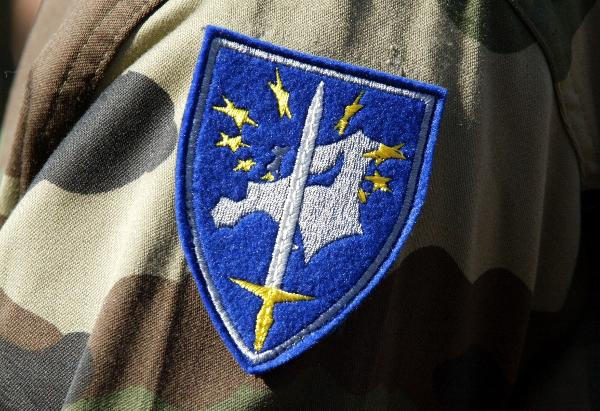
I’d held off posting this because it might end up being slightly (slightly) spoilery for Escalation. But only slightly.
The acronym “EDC” technically applies to two entities. The most obvious, and most well-known, is the European Defense Council, made up of select, appointed representatives of Germany, France, Belgium, Austria, Spain, Greece, Denmark, Portugal, Sweden, and Turkey (a late addition). The bulk of these representatives are German and French.
The European Defense Council is secretive, but has shown every sign of being an order of magnitude more tyrannical than the EU parliament that it effectively took over from. It continues to follow much the same policy guidelines, but they do not accept any feedback from national governments, and in fact expect that their edicts should be enforced across the old EU, to include the Eastern European countries, even nations that are not represented on the Council. Those nations are not deemed “mature” enough for a seat.
The EDC arose during the upheaval following the Yellow Vest protests and Italy’s abrupt withdrawal from the EU, after Britain’s. With the European Experiment in peril, the “biggest pack of utopian sociopaths you ever imagined” stepped up, forcing a vote to dissolve the EU parliament in favor of the EDC, which was granted emergency powers.
The “other” EDC is one that is not officially acknowledged by the Council, or any European news outlet. It exists only in whispers and conspiracy theories. Until Slovakia, anyway.
The European Defense Corps grew out of the near-disaster that was the first open engagement of the EU Army, during the Fourth Balkan War. While ostensibly all under the same supreme command, the EU Army was simply made up of disparate units from various European armies, all understrength and stretched to the breaking point. Personnel, logistics, equipment, communications, and training were all lacking. And despite the ideological blinders in Europe, the group that would become the European Defense Council saw the writing on the wall. If they were going to potentially go toe-to-toe with Russia—or, more likely, though never openly voiced, have to crack down on growing nationalist and populist movements in Central and Eastern Europe—they needed to change something. The new theories weren’t working, and there were a lot of body bags coming out of Serbia to illustrate it. They kept the cost as quiet as possible, and the main EU forces remained as “diverse” and “culturally and emotionally sensitive” as possible, but in the meantime, the ground began to be laid for the Corps.
Recruited in secret, trained and equipped in secret (there was plenty of money for the Corps’ equipment; it was mostly in “black” accounts and various other secret and officially illegal shelters and revenue streams), the European Defense Corps was built on the bones of the old Euro Corps and trained and commanded by French and German veterans of Afghanistan, Mali, and the Balkans. Impressed and indoctrinated heavily with the mission of a united Europe, and the evils of nationalism and traditionalism, the young men who were recruited, many of them foreigners, were subjected to a harsh training regimen, rivalling that of the French Foreign Legion (in fact, the Corps drew on several Legion officers to run the training, though the Legion itself disbanded and furled its colors rather than be subsumed into the Corps). Completely isolated from outside influences, the recruits were indoctrinated and drilled mercilessly for six months before any of them were allowed any liberty or leave.
It is believed (though officially denied by any government, whether under the auspices of the EDC or not) that the European Defense Corps now consists of a force almost the size of the US Marine Corps, to include three divisions, three air wings, and logistical capabilities to match. If such is the case, the bulk of the Corps’ forces have been kept scattered across the EDC countries, as the Euro Corps still appears to be little more than a political unit centered around the Franco-German Brigade in Strasbourg. However, recent reconnaissance photos and intel reports have suggested secluded compounds on multiple major French and German military bases, and even some bases that do not appear on any official accounting.
The EDC is not viewed as an unalloyed good by the rest of Europe, even in France and Germany. Far from it. There are pseudo-Marxist and far-right opposition groups, to include the Fourth Reich in Germany, which has connections with the identically-named neo-Nazi group in the United States. Several groups have grown out of the Yellow Vest protests in France, as well, demanding democratic reforms yet still clinging to certain social welfare ideas ingrained in Europe for decades.
But there are also more traditionalist resistance movements growing within both France and Germany. Nouvelle Gallia is the most prominent, holding actual autonomous territory in southwest France, ironically and oddly centered around Provence. Being a largely Catholic resurgence, more than one observer has remarked on the fact that the champions of Catholic and traditional France have their center of power in the territory of the old Albigensian Heresy.
Bavaria is the central region of dissent in Germany, which makes sense, since Bavaria is traditionally the most conservative region of the country. While not nearly as organized or powerful as Nouvelle Gallia, there are several semi-autonomous militias in Bavaria, using old Bundeswehr equipment and flying variations on the old Bavarian flag.
In a weird mirror-image, there has been more and more contact between Nouvelle Gallia and the Bavarian militias, paralleling the domination of the EDC by Paris and Berlin. Only time will tell what role the traditionalist dissidents will play in the war to come, especially given Bavaria’s mountainous and highly defensible terrain.
Very informative
Pingback:GunMag Gun News: 5x5 Friday for July 2019 - The Mag Life